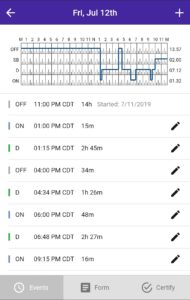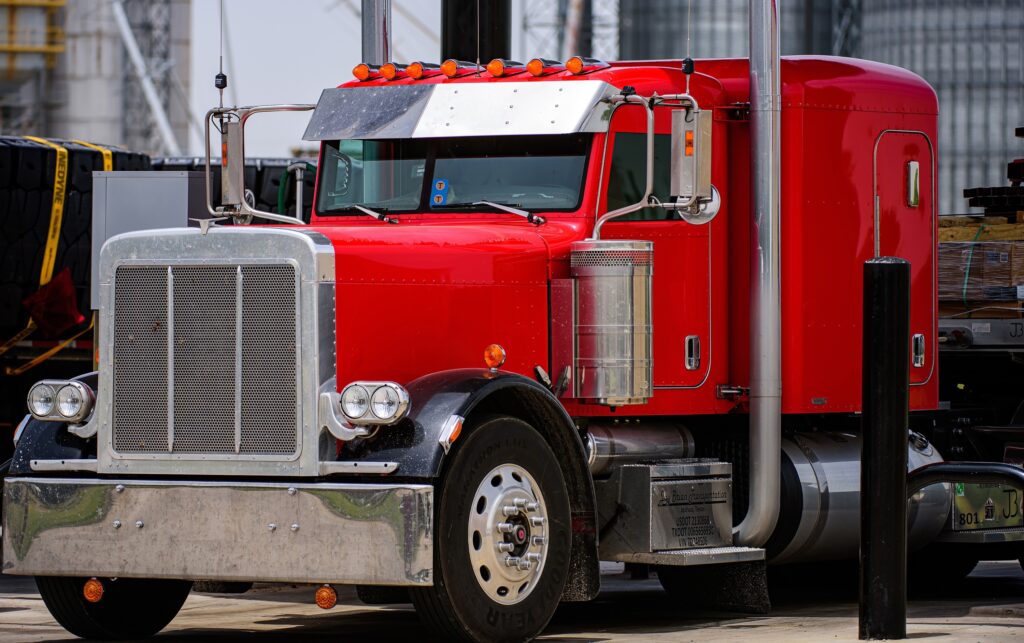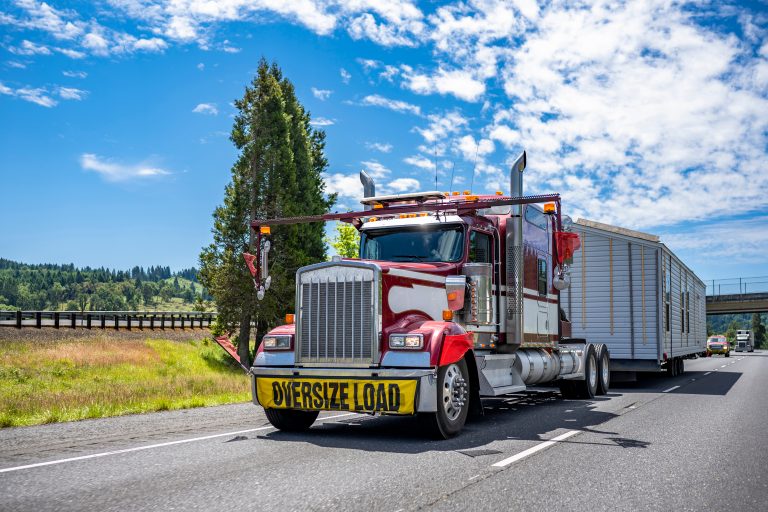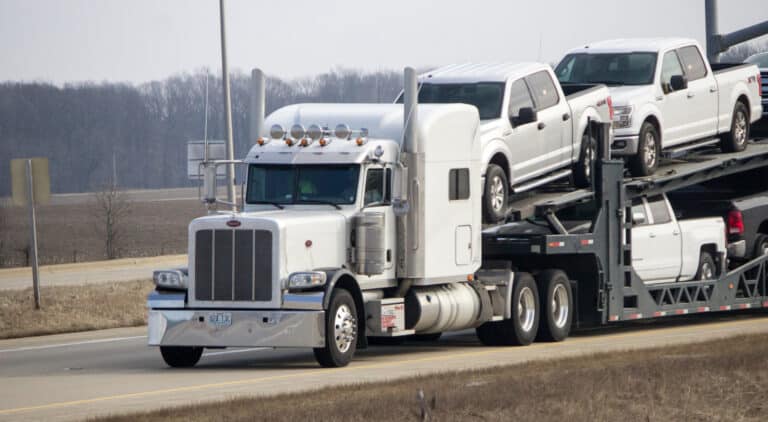Since the implementation of the ELD law, electronic logging devices have replaced traditional paper logbooks, automating the recording of driving time and hours of service. Failing to comply with this regulation can result in hefty fines, penalties, and even legal consequences. Motor carriers must, therefore, take the requirements seriously and seek out reliable ELD devices to enhance their compliance efforts.
Aside from accurately recording driving time, engine hours, location, and miles driven to achieve compliance, high-quality electronic HOS devices can offer extra features to help carriers improve operations and profitability, such as IFTA mileage calculations, vehicle maintenance feature, idle reporting, and DVIR among others. In this article, we will discuss these and other advantages of elogs, touching upon US DOT HOS regulations related to compliance, to help you choose an ideal solution for your business needs.
Who Needs HOS Electronic Logs to Comply with the DOT Regulations?
The US DOT HOS rules aim to gain a stricter control over CMV drivers’ working hours and HOS devices are mandatory for most commercial vehicle drivers operating trucks, buses, and certain types of vans involved in interstate commerce. This includes drivers who operate vehicles weighing 10,001 pounds or more, designed to transport 16 or more passengers, or carrying hazardous materials. However, there are some exemptions to these rules that allow certain drivers to use paper logs or time cards instead of recording this information electronically. These are the categories of operators that are exempt from the ELD law:
- Short-haul drivers operating within a 150 air-mile radius from their work location, as they use time cards instead of RODS.
- Drivers who keep paper records of duty status for a maximum of eight days in a thirty-day cycle.
- Drivers who deliver commodities through drive-away-tow-away operations.
- Drivers operating vehicles with engines manufactured before 2000.
For CMV operators who need to comply with the law, finding a reliable ELD is of utmost importance. Read about the characteristics of quality HOS devices in the next section.

Characteristics of Dependable HOS Devices
To achieve compliance with the ELD mandate and avoid violations, motor carriers should select a provider of HOS devices that satisfies the regulatory requirements set by the FMCSA. However, compliance alone is not enough; ease of use, post-sale services and overall user satisfaction can make electronic logs more practical, helping truckers manage their RODS effectively and boosting productivity. Here are the essential characteristics to look for in an electronic logbook:
- Quick and simple set-up. By selecting an ELD designed for smooth installation without the need for a technician, motor carriers can save time and money. Look for an option with a quick and effortless set up for minimal downtime and no installation cost.
- Clear pricing scheme. Trustworthy providers of HOS devices must avoid hidden fees and additional costs for operations that should be included in the service (ie. installation, activation, etc.). Ask about any extra charges or post-sale expenses before committing to a solution.
- Straightforward interface. Drivers need to be able to easily navigate and update their status, produce roadside inspection reports, and otherwise manage their logs to meet all federal requirements. An elog with an easy-to-use interface can lead to higher driver satisfaction, facilitating proper use of the electronic logbook and helping achieve compliance. Additionally, the logbook app should be compatible with the software platforms used by your drivers, supporting both Apple and Android operating systems to provide flexibility.
- Electronic DVIRs. Conducting pre-and-post-trip inspections of vehicles and equipment is crucial for ensuring road safety and identifying any defects before they become a hazard. Electronic DVIRs help streamline the inspection process, eliminating the need for paper forms and saving time.
- Compatible hardware. Managing a fleet that includes vehicles designed for various types of operations can be challenging, but integrating these vehicles into one system can bring significant benefits. A universal solution helps drivers and personnel reduce administrative overhead, allowing them to focus on learning one system instead of multiple ones, and making it easier for fleet managers to monitor their entire fleet on one platform.
Do you have any questions? Talk to ELD Advisor: 650-405-3372 or Request Callback
Achieve Compliance with US DOT HOS Regulations with HOS247
HOS247 is a trusted name in the ELD market, known for its focus on providing a reliable and user-friendly solution accompanied by top-rated customer support. In today’s competitive business landscape, driver satisfaction is more important than ever. That’s where HOS247 shines, as our HOS devices prioritize user experience. Let’s see what qualities have helped us build a solid reputation among truckers:
- Accessible technical support. HOS247 is dedicated to providing top-rated technical support to its clients. Customer reviews on the Apple App Store and Google Play platforms highlight the efficiency and friendliness of our tech experts available from Monday to Sunday. Fluent in Spanish and Russian, in addition to English, our multilingual reps make it easier for non-English speaking clients to receive the assistance they need.
- Callback policy. We understand that technical issues can be frustrating and disruptive, which is why we have a callback policy in place to ensure that if the call drops, our managers will contact you immediately.

- Driver-friendly app. The HOS247 app was designed to simplify taste for drivers. It offers a straightforward interface that facilitates RODS management, helping enhance compliance with the law.
- Hardware and software compatibility. Our HOS electronic logs seamlessly work with most types of trucks. Moreover, we offer compatibility with both Android and iOS devices, making it easier for drivers to manage their tasks on their preferred device.
- Easy installation. HOS247 understands that time is of the essence in the trucking industry. That’s why we have made it a priority to provide an ELD device that is easy to set up, requiring no special installation or technical expertise.
- Flexible subscriptions. At HOS247, we believe in providing our clients with the freedom to make changes as their business needs evolve. Our no-contract policy allows carriers to choose either a monthly or yearly subscription that they can easily upgrade or downgrade. This approach has been praised by our clients, who appreciate the simplicity and convenience of our subscription model.
- Two-week trial. HOS247 offers a two-week trial period for interested customers to evaluate the system’s performance and determine if it fits their needs.
- Extra features. In addition to its core functionality, the HOS247 ELD also offers tools that can help motor carriers streamline their operations and reduce costs. These include real-time GPS tracking, IFTA mileage tracking, idle reporting, and vehicle diagnostics. By integrating these tools into their operations, trucking companies can improve the quality of their service and boost productivity. For instance, real-time GPS tracking allows dispatchers to monitor the location of their trucks in real-time and optimize routes to avoid traffic and delays. Meanwhile, vehicle diagnostics can help identify potential mechanical issues before they become major problems, reducing maintenance costs and downtime.
HOS247’s ELD solution stands as a testament to our commitment to compliance, innovation, and user satisfaction. Meticulously designed to meet and exceed FMCSA standards, our system supports federal and intrastate HOS rules and exemptions, ensuring that fleets and owner-operators navigate the complexities of compliance with ease. Whether it’s adhering to the stringent requirements of the ELD mandate or leveraging the flexibility offered by specific exemptions, HOS247’s solution offers the versatility needed in today’s dynamic transportation landscape.
Using DOT Compliant Devices

Compliance with US DOT HOS rules is crucial for carriers and drivers who use electronic logging devices. The Federal Motor Carrier Safety Administration requires device manufacturers to certify that their product meets the established technical standards, including the accurate recording and display of date, time, location, engine hours, vehicle miles, and driver identification information. Once self-certified by the manufacturer, devices are listed on the FMCSA’s online registry of approved ELDs, allowing carriers and drivers to verify compliance. In the event of an elog removal from the registration list due to noncompliance, carriers have eight days to replace it with an approved system.
Additionally, ELD software must support FMCSA’s hours of service rules—discussed later. Manufacturers are also required to ensure that their devices accommodate various HOS exceptions, like those applicable during adverse driving conditions and emergencies.
The criteria set forth by the FMCSA for ELD compliance includes:
- Integration with vehicle engines. ELDs must be integrally synchronized with the engine of the vehicle. This synchronization ensures that ELDs automatically record engine power status, vehicle motion status, miles driven, and engine hours, providing an unassailable record of a driver’s on-duty time.
- Tamper-resistant design. To maintain the integrity of the data, ELDs are required to be tamper-resistant. Any attempts to manipulate or falsify the data should be detectable, and the devices must preserve the original information regardless of any subsequent changes.
- Accurate record of driver status. ELDs must accurately record the driver’s duty status changes and present a graph grid of daily duty status changes either on-demand or in printouts. The devices should allow drivers to input or edit their records, subject to monitoring and verification by fleet managers, to ensure accuracy.
- Data transfer capabilities. Compliance necessitates that ELDs have the capability to transfer data during roadside inspections. This can be through wireless web services, email, Bluetooth, or a USB 2.0 interface, facilitating seamless communication of HOS records to law enforcement.
- User authentication. ELDs must support driver and authenticated user identification, distinguishing between drivers, co-drivers, and administrative users. This feature ensures that records are accurately attributed to the correct driver.
- Location information. While maintaining driver privacy, ELDs are required to record the vehicle’s approximate location, detailed to a one-mile accuracy when on duty and a 10-mile accuracy during personal use or yard moves, providing context to the HOS data.
- Data annotation. Drivers must have the ability to annotate and edit their logs for accuracy, with original records being preserved. Any changes must be annotated to explain the reason for the amendment or correction.
- Resistant to unauthorized access. To protect driver privacy and data integrity, ELDs must be designed to resist unauthorized access. This includes safeguarding against data breaches and unauthorized alterations of records.
- Visual and audio warnings. ELDs should provide timely visual and auditory warnings to drivers about approaching HOS limits, aiding in proactive compliance with driving hours regulations.
- Record retention. ELDs are required to store data securely for a minimum period, typically six months, to enable auditing and compliance checks by the FMCSA or other authorized entities.
By adhering to these criteria, ELD manufacturers ensure that their devices meet the FMCSA’s requirements for compliance, safety, and efficiency. Motor carriers and owner-operators must select FMCSA-approved ELDs that fulfill these criteria to comply with the ELD mandate, thereby promoting safer roadways and more responsible fleet management practices within the industry.

Driving with HOS Devices in the US and Canada
Hours of service regulations stand as critical components in ensuring the safety and compliance of fleet operations in the United States and Canada. These regulations, while sharing a common goal of promoting road safety and reducing driver fatigue, show some differences and similarities reflective of each country’s specific legal and operational frameworks.
In the United States, the FMCSA mandates specific HOS rules, including the 11-hour driving limit within a 14-hour window, followed by a mandatory 10-hour off-duty period. Additionally, the regulations include a 30-minute break requirement after 8 hours of driving and the 60/70-hour limit over 7/8 consecutive days. Conversely, Canada’s regulations, enforced by Transport Canada, prescribe a 13-hour driving limit within a 14-hour workday, coupled with an 8-hour off-duty requirement. Canadian rules also encompass a 16-hour window from the start of the workday to complete all driving, with a weekly rest requirement of 36 consecutive hours off-duty.
Despite these differences, both countries emphasize the importance of rest and recovery to combat fatigue. Each set of regulations allows for specific exemptions and provisions, such as the Adverse Driving Conditions exemption, offering flexibility under challenging circumstances.
Managing cross-border operations between the United States and Canada presents unique challenges, including navigating two sets of HOS regulations, customs clearance, and ensuring seamless data transmission across jurisdictions. ELD providers can address these challenges by offering real-time location tracking, enabling automatic rule set switching, and ensuring data integrity and security across borders.
Compliance strategies for fleets traveling between the U.S. and Canada involve rigorous training for drivers on the specific HOS requirements of each country, regular audits of logbook entries, and leveraging elog technology for accurate record-keeping. Additionally, embracing a culture of safety and compliance within the organization can significantly mitigate the risks associated with cross-border operations.
Do you have any questions? Talk to ELD Advisor: 650-405-3372 or Request Callback
Role of the ELD Provider in Carrier Compliance
ELD providers play a pivotal role in the transportation industry, tasked with a significant responsibility: ensuring that their systems comprehensively meet the regulatory requirements set by governing bodies such as the FMCSA in the United States and Transport Canada in Canada. This duty encompasses a range of critical functions, from regular software updates and providing adequate support to managing data effectively and ensuring the reliability of hardware. These aspects are fundamental in maintaining the integrity of ELD systems, ensuring compliance, and ultimately safeguarding the safety and efficiency of fleet operations.
Software Updates and Compliance
ELD providers must regularly update their software to adhere to the latest regulatory changes and technological advancements. These updates are crucial for maintaining compliance with FMCSA regulations, addressing any vulnerabilities, and introducing new features that enhance user experience and operational efficiency. Providers are responsible for deploying these updates in a manner that minimizes disruption to fleet operations, often requiring seamless over-the-air (OTA) update capabilities.

Adequate Support for Users
The complexity of ELD systems and the intricacies of HOS regulations necessitate that providers offer comprehensive support services. This support includes technical assistance, training on system use, and guidance on regulatory compliance. Adequate support ensures that fleet operators and drivers can effectively utilize the ELD system, troubleshoot issues promptly, and understand the regulatory implications of their HOS data. Providers must ensure that their support teams are knowledgeable and accessible, offering multilingual assistance to cater to a diverse user base.
Effective Data Management
Managing the vast amount of data generated by ELDs is a critical responsibility of ELD providers. This involves not only securely storing the data but also ensuring its accuracy and integrity. Effective data management practices are essential for compliance with FMCSA regulations, which demand that HOS records be tamper-resistant and readily accessible for inspection. Providers must implement robust data security measures to protect against unauthorized access and data breaches, ensuring the confidentiality and integrity of sensitive information.
Reliable Hardware to Minimize Malfunctions
The reliability of ELD hardware is paramount in minimizing malfunctions that could lead to compliance violations and operational disruptions. Providers are responsible for designing and manufacturing hardware that is durable, resistant to the rigors of daily use, and capable of accurately capturing and transmitting data under various conditions. Ensuring hardware reliability involves rigorous testing, quality control processes, and quick resolution of any hardware issues through warranty support or replacements.
In fulfilling these responsibilities, ELD providers must navigate the complex landscape of regulatory requirements, technological challenges, and user needs. By ensuring their systems are up-to-date, supported, secure, and reliable, providers play a critical role in enabling fleets to remain compliant with regulations, optimize their operations, and contribute to the overall safety and efficiency of the transportation industry. The partnership between ELD providers, regulatory bodies, and fleet operators is essential in achieving these objectives, underscoring the shared commitment to safety and compliance in commercial transportation.

As an expert in B2B and B2C sales, I’ve dedicated myself to perfecting sales processes and client retention strategies in the logistics and trucking industry. I have significantly contributed to the expansion of the ELD service, catering to retail and wholesale clients in need of HOS247 ELD solutions. My unwavering commitment to implementing state-of-the-art sales techniques and technologies ensures the continuous growth and success of businesses I work with.












The FMCSA’s electronic logging device (ELD) mandate has changed how we track hours of service. Every long-haul trucker knows that ELDs are now part of daily life on the road. Since this regulation is here to stay, having a reliable

There’s an old saying that goes “trucking ain’t easy”. However, with CDL electronic logs, logistics operations in the trucking industry can drastically improve for commercial drivers, fleet managers, and owner-operators. Switching to the right electronic logging device can help them

Since the ELD mandate’s implementation in 2017, electronic logbooks have become an integral working tool both for CMV drivers and fleet managers. But, what does ELD stand for? ELD stands for electronic logging device. These digital tools must be used